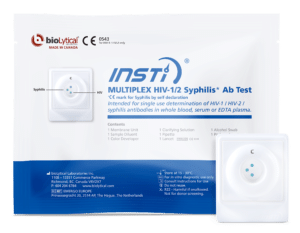
- Our Productsclose
Our Products
Easy. Quick. Accurate.
- HIV and Testing
- Stories
- INSTI Times
- Our Productsclose
Our Products
Easy. Quick. Accurate.
- HIV and Testing
- Stories
- INSTI Times



Trusted When It Matters The Most
The INSTI HIV-1/HIV-2 Antibody Test is a one-time use, rapid, visually read, flow-through immunoassay which detects antibodies to Human Immunodeficiency Virus (HIV) Type 1 and Type 2 using a drop of human fingerstick blood. Other sample types which can be tested are venous whole blood, plasma and serum.
The Rapid HIV Test is intended for use by trained personnel in medical facilities, clinical laboratories, emergency care situations, and physicians’ offices as a screening assay capable of providing test results in as little as 60 seconds. The assay is packaged as a kit containing INSTI® Membrane Units, Sample Diluent, Color Developer and Clarifying Solution, and is available in point-of-care use packaging.
Benefits
-
Rapid
Test yields results in as little as 60 seconds
-
Flexible
Its rapid results makes it easy to include in a variety of workflow models
-
Compatible
INSTI works with most testing algorithms
-
Sensitive
Detects IgM and IgG Antibodies
Features
-
Unique immunofiltration “flow-through” design
-
Built-in IgG capture procedural control
-
Proprietary HIV antigen
-
Lancet, pipette, and alcohol swab included
-
No timers required
-
Spill-free membrane

Accuracy
Sample Type
Sensitivity
Specificity
Fingerstick Blood
> 99%
> 99%
Disclaimer
For more information, see our INSTI HIV-1/HIV-2 Antibody Test Instructions For Use.Approved and Certified By




How to Use INSTI
INSTI is trusted by healthcare professionals globally with over 15 million tests already performed. The INSTI platform provides accurate results in 1 minute, where other competing products require 20 minutes to days for their results.

Collect blood
Use the lancet to prick your finger and collect a drop of blood.

Add Blood Sample
Add your blood into Bottle 1 and shake.
Pour Solutions
Shake and pour solutions one at a time.

Discreet, easy, and accurate results
What Our Customers Are Saying
DeWayne Ford
This year we were able to test 72 people in a single day. As the event promotes HIV/AIDS awareness, it’s natural that we would also offer rapid HIV testing. We want to make sure everyone knows they can get their test results in 60 seconds. It’s so much easier and more attractive for people to come and get tested if they know it’s that fast.
Steven
When testing is fast and portable, it’s so much easier to offer it there and then. Removing the barriers to access is a huge priority for us. The INSTI test kit is game-changing because it allows people to know their status so quickly.
Jonathon
With the last test we were using, there were some concerns about window periods and the length of time it took for the test to run. It made outreach testing too complicated. Very quickly after trying INSTI in the field, we realized that a one-minute test would be ideal for use in public spaces and it could enhance our outreach programs



